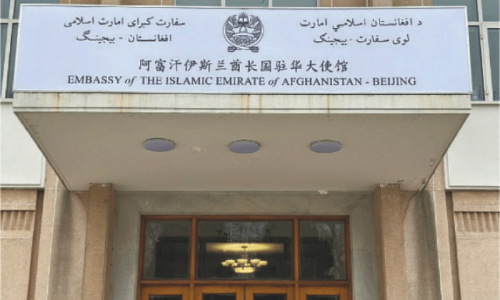The United Arab Emirates has said that the decision to accept the credentials of the Afghan ambassador was based on a desire to help the people of Afghanistan.
The Afghan foreign ministry had said in a statement late on Wednesday that Mawlawi Badreddin Haqqani had been nominated as its ambassador and presented his credentials to the UAE’s foreign ministry’s assistant undersecretary for protocol affairs.
In a statement sent to Dawn.com on Saturday, the UAE Ministry of Foreign Affairs said: “The decision to accept the credentials of the ambassador of Afghanistan reaffirms our determination to contribute to building bridges to help the people of Afghanistan.”
It said the help would include the provision of humanitarian assistance through development and reconstruction projects and supporting efforts towards regional de-escalation and stability.
“The world recognises the challenges faced by Afghanistan over the past few years,” it said.
The Afghan Taliban government has not been officially recognised by any foreign capital and only Beijing has formally accepted the credentials of an ambassador.
The Taliban have also sent envoys to several countries, including Pakistan, to head missions as “chargé d’affaires”.
The Taliban share economic ties with the UAE, which won contracts to run operations at Kabul airport in 2022. Interior minister Sirajuddin Haqqani, designated as a “specially designated global terrorist” by the US, met UAE President Sheikh Mohamed bin Zayed Al Nahyan in Abu Dhabi in June.
The Taliban entered the Afghan capital on August 15, 2021, as the Afghan security forces, set up with years of Western support, disintegrated and US-backed president Ashraf Ghani fled.
Though China and the UAE have not formally recognised the Taliban administration or confirmed any official change in relations, diplomats and international analysts say formally accepting an ambassador is a grey area of international diplomacy that could constitute upgraded ties.
Many governments, especially Western nations, including Washington, have said the path to any formal recognition of the Taliban will be stuck until they change course on women’s rights and re-open high schools and universities to girls and women.
The Taliban say they respect rights in accordance with their interpretation of Islamic law and that restrictions on its banking sector and a lack of recognition are hindering its economy














































Dear visitor, the comments section is undergoing an overhaul and will return soon.